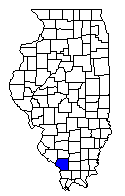
GEORGE KENNEDY. Many years of active connection with the contracting
interests of Jackson county have made the name of George Kennedy widely
known in this field of endeavor, and some of the largest and most important
engineering movements carried on in this section in his time were brought to
a successful conclusion by him. Mr. Kennedy was a product of Murphysboro,
born in that city on March 30, 1859, and was a son of George and Ellen C.
(Ross) Kennedy.
George Kennedy, the father of George Kennedy of
Murphysboro, was born in Ireland, February 24, 1822, and came to the United
States in 1851, locating in Murphysboro in May of that year. He had received
a good education in his native land, and there had learned the weaver's
trade, which he followed for a short time with his uncle in New York, and
also in the city of Boston, later entering a cabinet maker's shop, where he
became skilled in that trade. One of the first enterprises with which Mr.
Kennedy was connected was the erection of Dr. John Logan's home in
Murphysboro, and in this city he opened a furniture store and cabinet shop,
where for years he was engaged in the manufacture of furniture and coffins.
He and his brother put in the counters and shelves in the first of
Carbondale 's business establishments, when that, town was struggling for
existence in 1853, and eventually Mr. Kennedy opened a hardware store, where
he dealt extensively in stoves and agricultural implements, later selling
this property to his son. He was married in 1854 to Ellen C. Ross, a native
of Vermont, who died in 1885. Prom 1856 to 1893 Mr. Kennedy served as
Justice of the Peace, and made an admirable public official. He brought the
first carload of wagons to Jackson county, as well as some of the first
buggies and farming machinery, erected one of the good brick business blocks
in this city, laid out Kennedy's addition to Murphysboro, was a director in
the First National Bank, and was one of the organizers and for years a
director of the Southern Illinois Milling Company. A charter member of the
I. 0. 0. P. lodge, No. 132, he represented it several times in the Grand
Lodge of the state, and was widely known and very popular in fraternal
circles. He was equally well known in religious circles, organizing the
Lutheran church here, of which he served as trustee for a number of years.
George Kennedy, Jr., received a good education, attending the public
schools and the Southern Illinois Normal University, from which he was
graduated in 1878. He early began to show evidence of good business and
mechanical qualifications, and at the age of nine years put a tin roof on a
home in Murphysboro, which is still in a good state of repair. He clerked in
his father's shop for some time and assisted in the work incidental to such
an establishment, but at the age of nineteen years, in 1878, he began
teaching at the old Ozburn school as second assistant, after which he taught
for some time in a summer school. Subsequently he returned to his father's
store and succeeded to the ownership thereof, but in 1891 he sold his
interest in this business, as his contracting interests were then demanding
all his time and attention. In connection with his store business he had
carried on farming, contracting and brick manufacturing, and after leaving
the business he laid the foundation for the M. & 0. Railway shops. He was
superintendent of the first construction of the water works and electric
light plant, of which company he was one of the organizers and for years a
director; he built the washing plant of the Brush Coal Mining Company at
Dewmaine, the coke ovens at Sparta, and Dean's mills at Ava, and then
engineered the construction of the first sanitary sewerage system in
Carbondale. He built the West Side sewer system in Murphysboro, made plans
and superintended the paving of Murphysboro 's streets for eight miles, and
was City Engineer of Murphysboro, a position which he held for ten years,
and he engineered and superintended the paving of all the streets in
Pinckneyville. He staked out and began the construction of the Murphysboro
Paving Brick Company's plant and constructed an additional five miles of
dredge ditch at Oakwood farm, where he had previously put in five miles.
On April 19, 1881, Mr. Kennedy was married to Miss Kate Harwood, and six
children were born of their union. They are: Myrta, who became the wife of
W. P. Hunt, of Cairo, who died on December 13, 1905, leaving one son, George
Lynwood Hunt, now with his mother; Marietta, the wife of C. M. Clayton, a
fruit grower and civil engineer of Loma, Colorado, and they have one child,
Mary Dee; Eula, a teacher in the public schools of Murphysboro; Doris Leora,
Lucy and William George, being in the family home as yet. Mr. Kennedy was a
Republican in his political beliefs, and was always active in the ranks of
his party while living. He was associated with the Illinois Water Supply
Association and the Illinois Society of Engineers and Surveyors. No one in
Southern Illinois was better known in his line of work, and both in his
business and outside of it he possessed a large number of warm, personal
friends. Mr. Kennedy passed away on October 28, 1911 and is deeply mourned
in the lives of all who were privileged to know him.
Extracted 16 Jan 2018 by Norma Hass from 1912 A History of Southern Illinois, volume 2, pages 1043-1045.
Randolph |
Perry | Franklin |
Perry MO |
 |
Williamson |
| Union |


